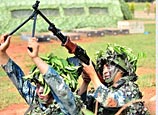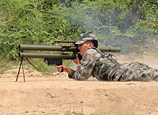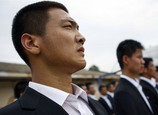
Experts have voiced skepticism over an initiative by an urban management authority in Hubei province to rank its officers on their performance.
The authority in Wuhan, the provincial capital, plans to rank its officers with a new scoring system.
A publicity head with the authority said on Monday more details of the ranking system will be released this week.
The authority said each road in Wuhan will have one officer, or chengguan, in charge of urban management. The officer will be punished if problems, such as illegal businesses operating on the streets, are found and not dealt with properly.
At the end of every year, the authority will rank the 20 officers who perform the best and the 10 who perform the poorest, with the latter facing dismissal if serious problems are found.
The move is an attempt by the city's authority to explore better ways of urban management.
In China, chengguan are usually in charge of enforcing bylaws, city appearance, environment, sanitation, work safety and pollution control. But relations between them and street traders are tense, with the officers often accused of treating people badly.
This negative reputation has been highlighted by a video capturing their brutal tactics in Yan'an, Shaanxi province, in which officers are seen trying to confiscate a shop owner's bicycles, with one of them stomping on the owner's head.
In May, the urban management authority in Wuhan's Hongshan district approved a plan to assign two officers to operate a small business on a street so they could experience the life of the traders.
Qin Qianhong, a law professor in the School of Law at Wuhan University, welcomed Wuhan's innovative move but voiced concern over the scoring plan.
"The ranking system seems impractical, especially in terms of methods to rank the 10 officers who perform poorly," he said.
"Who is going to rank them and what are the standards? These questions have to be answered," said Qin, who has researched many reform plans for Wuhan's urban management authority.
He said the scoring system could be effective in improving officers' working style, as the number of officers is rising. But it may affect enthusiasm for the job.
Qi Xiangao, a lawyer based in Wuhan, said the current scoring system in government departments is already very detailed. If the Wuhan authority tries to introduce reforms, these should be fair and in accordance with related regulations.
In recent years, Wuhan has taken a number of measures to improve the public image of chengguan. For example, in October 2012, officers in the Hongshan district gave roses to street vendors, a move aimed at encouraging them to cooperate with law enforcers.
Zhao Yang, head of Hongshan chengguan, said Wuhan's reform plans on urban management were launched in 2011 and have received good feedback.
Illegal businesses operating on the streets dropped by 60 percent year-on-year as of June this year, Zhao said.
Qi, the lawyer, said he has witnessed some of the reforms in law enforcement, but as the city's infrastructure expands rapidly urban management remains a big problem, especially pollution and heavy traffic.
Difficulties with urban management officers' jobs, including tense relations with the public, can be found across the country.
"The problems were brought by China's rapid urbanization," said Qin Qianhong, the law professor.
Wuhan's reforms in recent years have made the job of urban management more efficient, he said.
But he warned that the authorities have to consider whether giving officers a comprehensive role may result in them having too much power, which could cause conflicts between them and other departments as well as with the public.
Liu Kun contributed to this story.
















 Childhood in an isolated sterile room
Childhood in an isolated sterile room


![]()
